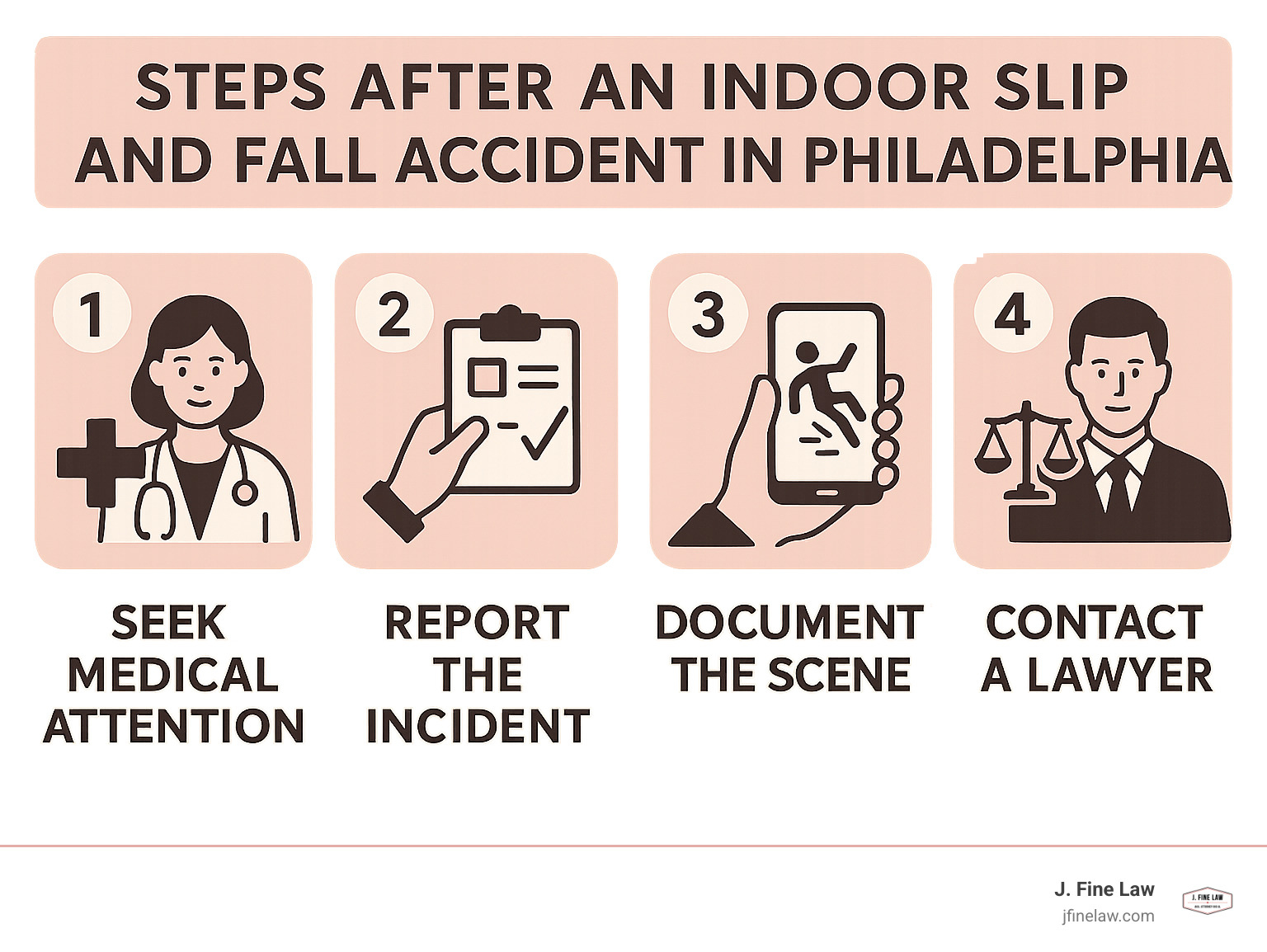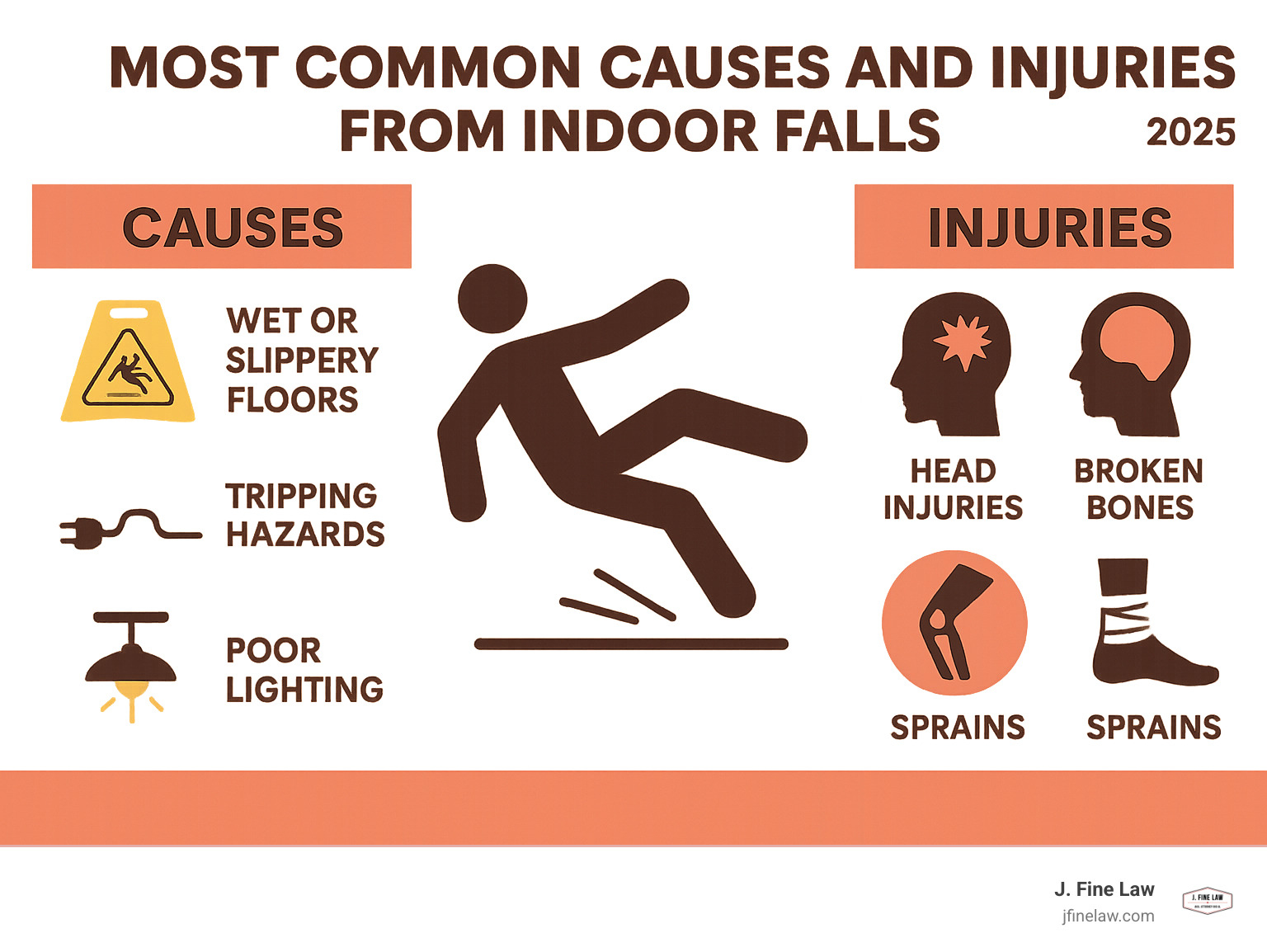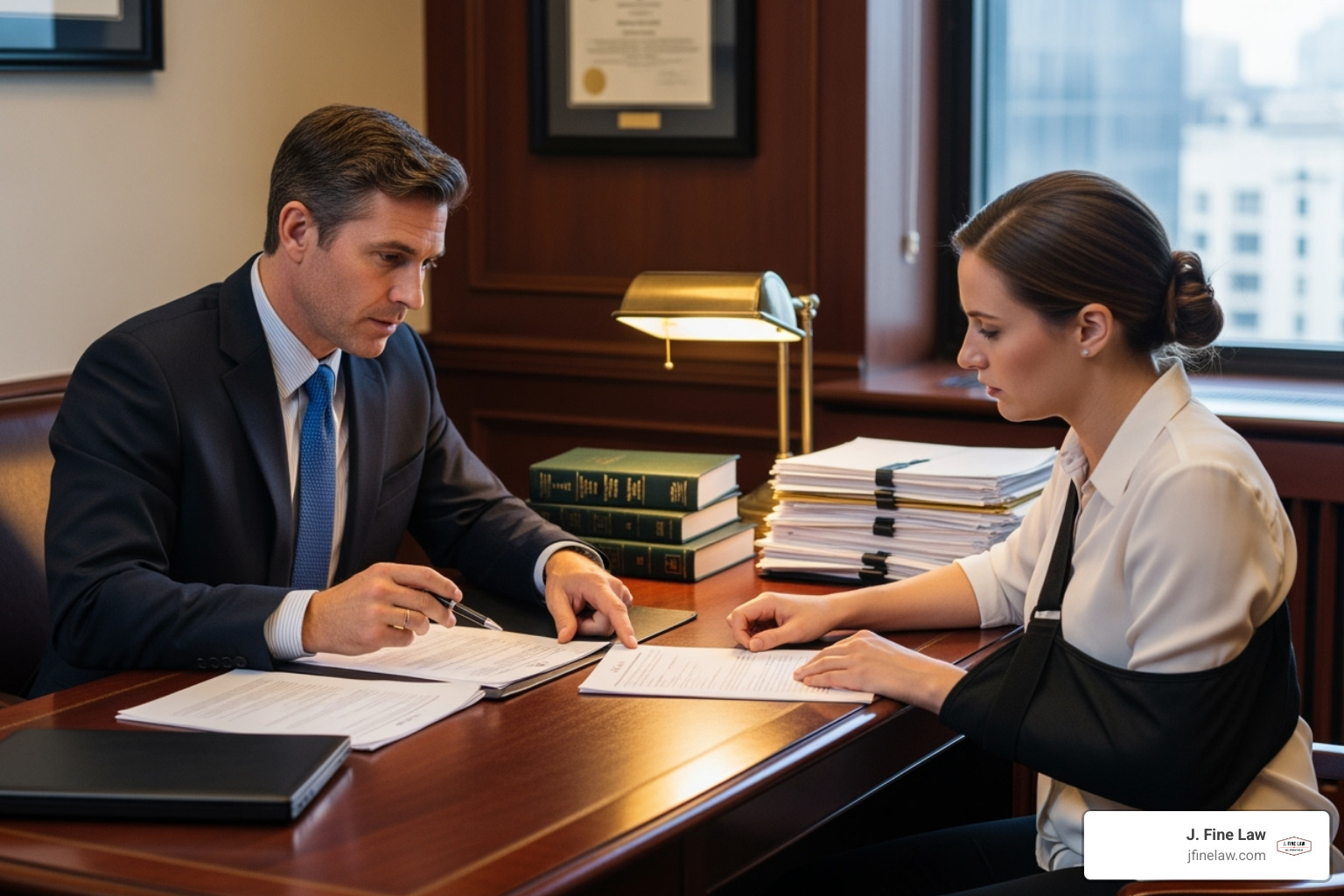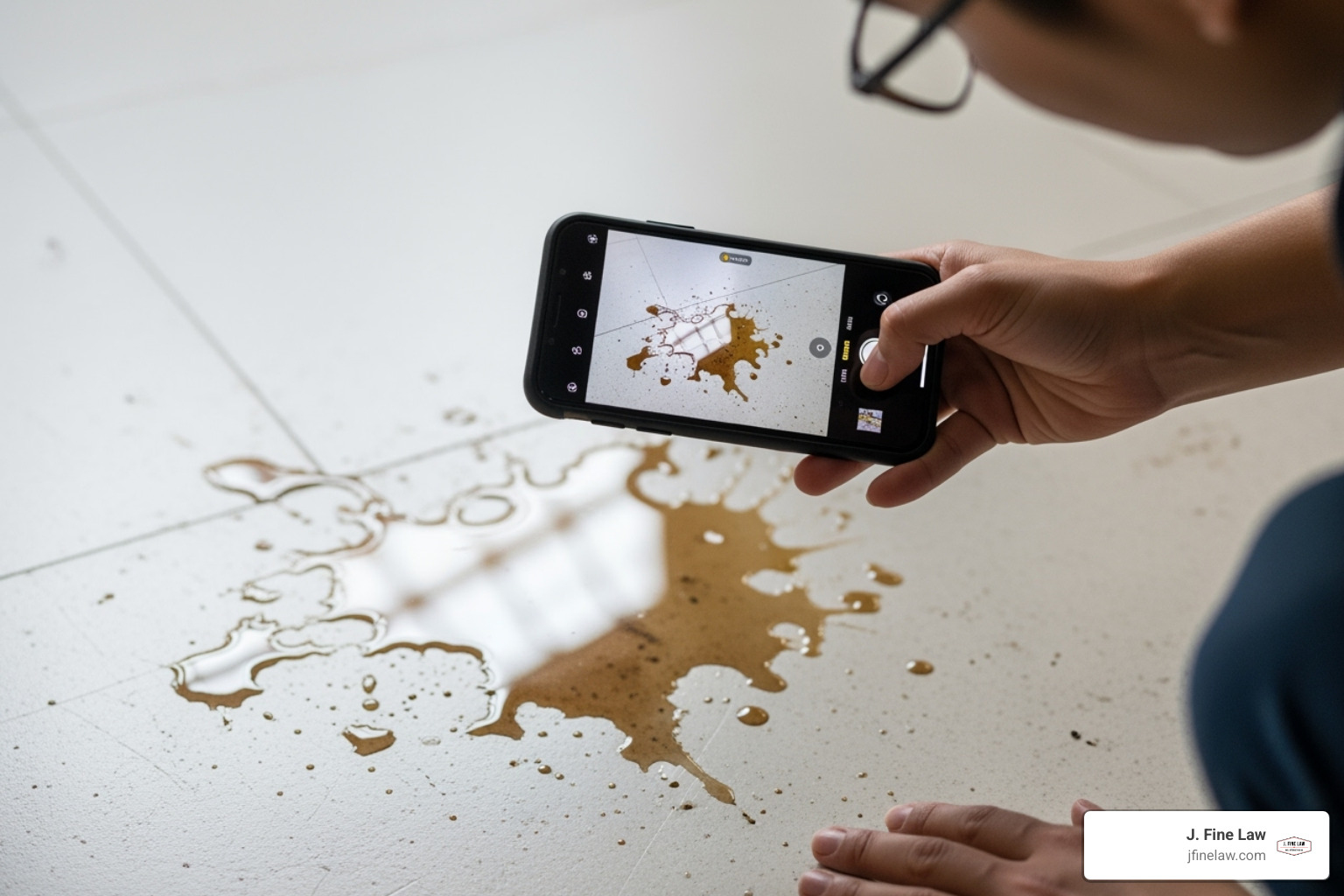Understanding Indoor Slip and Fall Accidents in Philadelphia
If you’ve been injured in a fall, a philadelphia indoor slip and fall lawyer can be essential. These accidents can cause serious, life-changing injuries. Property owners have a legal duty to keep their spaces safe, and when they fail, you may be entitled to compensation. After a fall, prioritize your health by seeking medical attention, then report the incident, document the scene with photos, gather witness information, and contact an attorney before speaking with insurance companies.
I’m Jason Fine, a founding member of J. Fine Law Group, P.C., with over 25 years of experience helping victims secure the compensation they deserve.
Basic philadelphia indoor slip and fall lawyer vocab:
An indoor slip and fall happens when an unsafe condition on someone’s property causes injury. This falls under premises liability law, which holds property owners responsible for negligence. These incidents can occur anywhere from supermarkets and malls to office buildings and hospitals. Falls are a leading cause of ER visits, with slips and falls accounting for over a million of those visits annually. The consequences can be severe, especially for the elderly, and the associated costs reach billions each year.
Common Indoor Hazards That Lead to Accidents
Common hazards in slip and fall cases include:
- Wet Floors and Spills: From mopped floors without warning signs to spilled products or tracked-in rain and snow.
- Poor Lighting: Dimly lit hallways, stairwells, or parking garages can obscure dangers.
- Torn Carpeting and Uneven Surfaces: Ripped carpets, loose floor tiles, or uneven transitions between flooring types.
- Broken Stairs and Faulty Handrails: Loose steps or missing/broken handrails on staircases.
- Obstructed Walkways: Aisles blocked by boxes, debris, or electrical cords.
- Other Unsafe Conditions: This includes falling objects, malfunctioning escalators, or other unaddressed dangers.
If you were injured by such a hazard, our team can help. Learn more about our approach to Philadelphia Slip Falls.
The Serious Consequences and Injuries from an Indoor Fall
A slip and fall can result in severe, life-altering, or even fatal injuries. Common injuries include:
- Bone Fractures: Broken hips, wrists, and ankles are frequent and painful outcomes. A hip fracture can be devastating for an older adult’s independence.
- Head Injuries and Traumatic Brain Injuries (TBIs): A fall can cause concussions or severe TBIs with long-term cognitive effects. We have extensive experience with these cases; learn more on our Philadelphia Traumatic Brain Injury page.
- Spinal Cord, Back, and Neck Injuries: These can range from herniated discs to paralysis, often requiring long-term medical care.
- Lacerations: Deep cuts from contact with sharp surfaces can cause significant scarring.
- Wrongful Death: Tragically, a fall can be fatal, particularly for the elderly or those with pre-existing health conditions.
The Legal Duty of Property Owners in Pennsylvania
In Pennsylvania, property owners have a legal “duty of care” to keep their premises reasonably safe for visitors. This means they must regularly inspect for, repair, and warn about potential hazards. If an owner knew or should have known about a dangerous condition (constructive notice) and did nothing to fix it, they can be held negligent.
Proving negligence is the key to a successful claim. A philadelphia indoor slip and fall lawyer must show:
- Duty: The owner owed you a duty of care.
- Breach: The owner breached this duty.
- Causation: The breach caused your fall and injuries.
- Damages: You suffered actual harm (medical bills, lost wages, etc.).
Demonstrating negligence requires the skill of an experienced Philadelphia Premises Liability Lawyer.
How a Philadelphia Indoor Slip and Fall Lawyer Can Win Your Case
After a fall, you face medical bills, lost income, and the stress of dealing with insurance companies. A skilled philadelphia indoor slip and fall lawyer levels the playing field. At J. Fine Law, we fight to get you the fair compensation you deserve.
Winning a case means proving the property owner was negligent. We do this by building a strong case with solid evidence, negotiating effectively with insurers, and, if necessary, representing you in court. Insurance companies aim to pay as little as possible. They may offer a low settlement or try to blame you for the fall. Our team has decades of experience countering these tactics to protect your interests.
We will work to calculate all your damages, including medical bills, lost wages, and pain and suffering, to ensure you receive maximum compensation. To learn more about our work, visit our Philadelphia Personal Injury Lawyer page.
Building Your Case: Essential Evidence to Collect
Key evidence includes:
- Photographs of the hazard: Take many photos and videos of what caused you to fall, the surrounding area, and your injuries.
- Video surveillance: Many businesses have security cameras that may have captured the incident.
- Witness statements: Get names and contact information from anyone who saw what happened.
- Incident report: A copy of the official report filed with the property manager is crucial documentation.
- Medical records: All records from doctors, hospitals, and therapists prove the extent of your injuries.
- Proof of lost wages: Pay stubs or a letter from your employer can document lost income.
The sooner you contact our philadelphia indoor slip and fall lawyer team, the better we can preserve this evidence and build a strong case.
Your Status on the Property Matters: Invitee, Licensee, or Trespasser
In Pennsylvania, a property owner’s duty of care depends on your legal status as a visitor. This classification is a key factor in your case.
| Visitor Classification | Definition | Duty of Care Owed by Property Owner |
|---|---|---|
| Invitee (Business Visitor) | Someone invited onto the property for the owner’s benefit, typically for business purposes. | Highest duty of care. Owner must inspect for and repair all known and reasonably findable hazards, and warn of those that cannot be immediately fixed. |
| Licensee (Social Guest) | Someone legally allowed on the property for their own purposes, often a social guest. | Owner must warn of known dangerous conditions that the licensee is unlikely to find. No duty to inspect for unknown hazards. |
| Trespasser | Someone on the property without permission or legal right. | Generally, no duty of care owed, except to avoid intentional, wanton, or willful harm. |
- An invitee (e.g., a customer in a store) is owed the highest duty of care.
- A licensee (e.g., a social guest at a friend’s home) must be warned of known dangers.
- A trespasser is owed a minimal duty, though exceptions exist for children under the “attractive nuisance” doctrine (e.g., an unfenced pool).
Our team will analyze the details of your visit to determine the property owner’s exact responsibility to you.
Critical Deadlines: Pennsylvania’s Statute of Limitations
In Pennsylvania, you have a limited time to file a personal injury lawsuit. This deadline is called the “statute of limitations,” and missing it can permanently bar you from seeking compensation.
For most slip and fall cases, you have two years from the date of the injury to file a lawsuit, as per 42 Pa. C.S. § 5524(2).
There are critical exceptions:
- Findy Rule: If an injury is not finded immediately, the two-year clock may start from the date the injury is reasonably finded (or should have been finded) rather than the date of the accident.
- Minors: For a minor, the clock typically starts on their 18th birthday.
- Claims Against Government Entities: If your fall occurred on government property, you have a much shorter deadline. You must provide a formal written notice of your intent to sue within six months of the accident. Missing this notice can end your claim.
Due to these strict deadlines, it is vital to contact a philadelphia indoor slip and fall lawyer as soon as possible.
What to Do After an Indoor Fall: Your Next Steps
The steps you take immediately after a fall can significantly impact your ability to recover compensation. Here is a focused guide on what to do:
- Seek Medical Attention: Your health is the priority. Adrenaline can mask serious injuries like concussions or internal damage. A medical record also creates a direct link between the fall and your injuries, which is crucial for your claim.
- Report the Incident: Inform the property owner or manager immediately. Insist on filing a formal accident report and get a copy. If they refuse, document the name of the person you spoke with, and the time and date.
- Document the Scene: Use your phone to take extensive photos and videos of the hazard that caused your fall, the surrounding area, lighting conditions, and any visible injuries. There is no such thing as too much photographic evidence.
- Gather Witness Information: If anyone saw you fall, get their name and contact information. Independent witness testimony can be invaluable.
- Preserve Evidence: Keep the shoes and clothing you were wearing at the time of the fall in a safe place without washing them. They may hold trace evidence.
- Be Careful What You Say: Avoid admitting fault or apologizing. Simple statements like “I’m so clumsy” can be used against you by insurance companies. Stick to the facts.
- Do Not Sign Anything: Do not sign any documents or provide a recorded statement to an insurance adjuster without first consulting with a philadelphia indoor slip and fall lawyer.
Proving Negligence: What Your Philadelphia Indoor Slip and Fall Lawyer Must Show
To win your case, your lawyer must legally prove the property owner was negligent. This involves demonstrating that the owner breached their duty of care by either creating the dangerous condition, knowing about it and failing to act, or failing to find a hazard that a reasonable owner should have found. We then connect this breach directly to your fall and the resulting damages, such as medical bills and lost wages.
Why You Need a Philadelphia Indoor Slip and Fall Lawyer Immediately
Trying to handle a slip and fall claim alone means facing insurance companies whose primary goal is to minimize or deny your payment. They employ adjusters and lawyers to protect their bottom line, not your well-being. They will use tactics to shift blame onto you, which is especially damaging under Pennsylvania’s comparative negligence rule—if you are found more than 50% at fault, you receive nothing.
At J. Fine Law, we level the playing field. We handle all communications with insurers, build a powerful case based on evidence, and fight for the maximum compensation you are owed. Our 98% success rate and over $50 million in settlements reflect our commitment to our clients. We work on a contingency fee basis, meaning you pay no fees unless we win your case.
Don’t steer this complex process alone. Protect your rights and focus on your recovery.
Contact our Philadelphia slip and fall attorneys for a free consultation today. We’re ready to help you stand tall after your fall.





